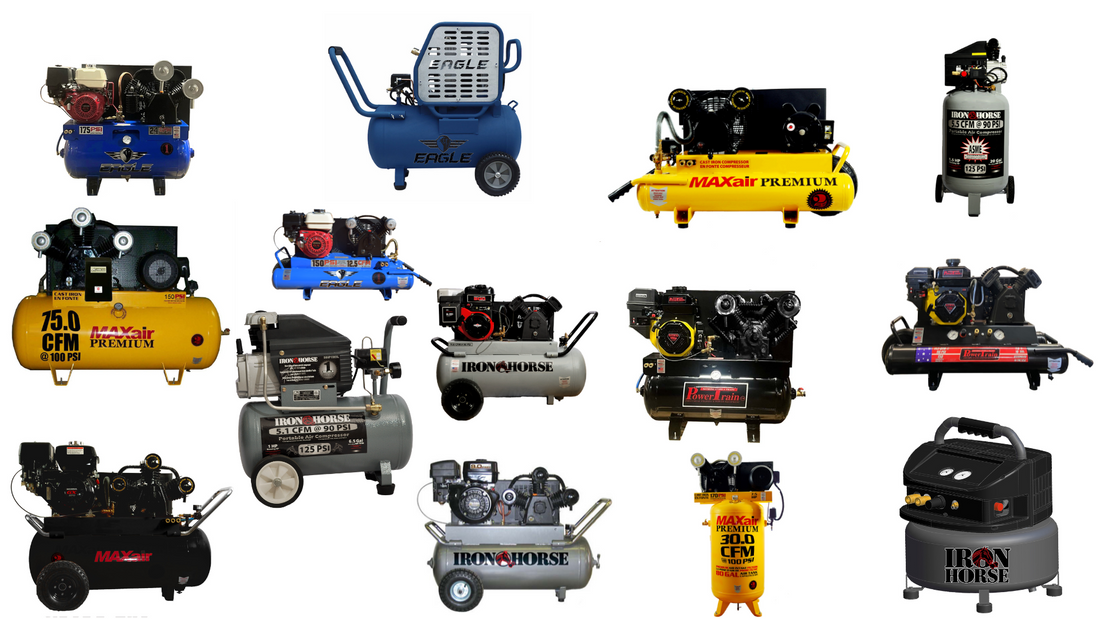
How to Choose the Right Air Compressor for Your Needs
Share
When selecting an air compressor, it's crucial to consider your specific needs to ensure you get the best performance and value for your investment. Whether you're a DIY enthusiast, a contractor, or an industrial professional, the right air compressor can enhance efficiency and productivity. Here's a comprehensive guide to help you make an informed decision.
1. Determine Your Application
The first step in choosing an air compressor is identifying what you'll use it for. Air compressors come in various sizes and power levels to accommodate different applications, including:
- Home & DIY Use – Inflating tires, small painting projects, and powering basic air tools.
- Construction & Contracting – Operating pneumatic tools like nail guns, jackhammers, and impact wrenches.
- Industrial Applications – Running high-powered machinery, automated production lines, and large-scale manufacturing.
2. Understand Air Compressor Types
There are several types of air compressors, each suited for specific tasks:
- Pancake Compressors – Compact and portable, ideal for light-duty tasks.
- Hot Dog Compressors – Similar to pancake compressors but with a horizontal tank for better stability.
- Twin-Stack Compressors – Feature two air tanks for increased air supply and efficiency.
- Stationary Compressors – Designed for industrial and shop use, offering large air storage and continuous power.
- Rotary Screw Compressors – Best for commercial and industrial applications, providing a continuous air supply.
3. Consider Power and Performance
Check the CFM Requirements for Your Tools
One of the most important factors when choosing an air compressor is ensuring it provides enough airflow for your tools. Each air tool has a specific CFM (Cubic Feet per Minute) requirement at a given PSI. To determine the right compressor:
- Check the CFM rating of the tools you plan to use.
- Add up the CFM ratings if you plan to run multiple tools simultaneously.
- Choose a compressor with a higher CFM output than your highest-rated tool to ensure consistent performance.
CFM (Cubic Feet per Minute)
CFM measures the airflow rate of an air compressor. Higher CFM is required for tools with high air consumption, such as sanders and grinders.
PSI (Pounds per Square Inch)
Most air tools require around 90 PSI to operate efficiently. Ensure your compressor meets or exceeds this requirement.
Tank Size
A larger tank (measured in gallons) allows for longer run times before the compressor needs to cycle on. Consider:
- Small tanks (1-6 gallons) – Best for short bursts of air, such as inflating tires.
- Medium tanks (7-30 gallons) – Suitable for intermittent use of pneumatic tools.
- Large tanks (30+ gallons) – Required for industrial applications and continuous air demand.
4. Choose Between Oil-Free or Oil-Lubricated
- Oil-Free Compressors – Require less maintenance and are lighter, making them ideal for home use and light-duty tasks.
- Oil-Lubricated Compressors – Provide better durability and longevity, making them suitable for heavy-duty applications.
5. Portability vs. Stationary
- Portable Compressors – Easy to move, great for job sites and DIY projects.
- Stationary Compressors – Designed for workshops and industrial settings where high power is needed.
6. Consider Noise Levels
If noise is a concern, look for compressors with lower decibel (dB) ratings. Oil-free compressors and smaller units tend to be quieter, while industrial compressors may require sound-dampening solutions.
7. Evaluate Additional Features
Some air compressors come with added features for convenience and efficiency, such as:
- Automatic Drain Valves – Helps prevent moisture buildup.
- Thermal Protection – Prevents overheating.
- Multiple Hose Outlets – Allows simultaneous tool operation.
8. Set a Budget
Air compressors range from budget-friendly options for home use to high-end models for industrial applications. Determine your budget based on your needs and the expected frequency of use.
Conclusion
Choosing the right air compressor depends on your specific needs, whether for home projects, construction work, or industrial operations. By considering factors such as power, tank size, portability, and additional features, you can find a compressor that delivers the performance and reliability you require. Need expert advice? Contact us today to find the perfect air compressor for you!
